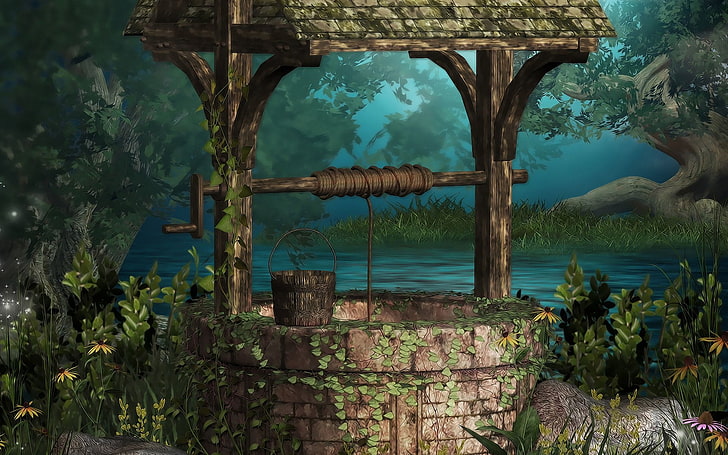Water Well
Water wells are excavations providing access to groundwater. Water is drawn up with buckets or water bags by hand. In the country, the well's resultant water is typically pure and sweet-tasting, as within the game era there is little to poison the groundwater. Wells are built adjacent to rivers because the surrounding soil produces a better tasting water. Wells can be built near oceans, even within a hundred yards in some cases, as the soil leaches out salt and enables access to fresh water.
All habitations possess at least one well, even a lone farmstead. In larger habitations, a minimum of one well is needed for every 250 persons.
These are carefully spaced out so as to not denude the water table in any one place. Wells are also important for the putting out of fires; often a village or town well is located exclusively for this purpose.
Construction
Wells are sunk by hand digging, with a structure lined with brick or stone as the excavation proceeds. Once the water table is reached, the lower construction floods naturally. Well diggers can expect to encounter water within 18 to 26 ft. at the most, but wells down to 43 ft. are known. Wells sometimes include small roofs in order to protect the well mechanism from rain and weather.
However, it can be impractical to dig wells where hard rock is present, or where the water table is simply too far down. For this reason, settlements are founded on hills only when the water table is high enough. We may assume that the location of settlements and smaller habitations are not accidental, but are demonstrative of those places where access to well water was available.
Dependence
All places are dependent upon fresh water for drinking and life. Siege attacks sometimes attempt to poison wells by hurling infested animals or body parts into a city, but this is rare. The attackers know that once a place is taken, they'll be as dependent upon the water sources there as the residents.
If a well dries up during bad times, dowsing for water may be tried to relocating a well, as can further digging. Occasionally, a permanent decline in water supply can bring about the end of a farm or village, as the residents are forced to move elsewhere.
See also:
Cistern
Hammer (symbol)
The Adventure
Type-7 Hex
